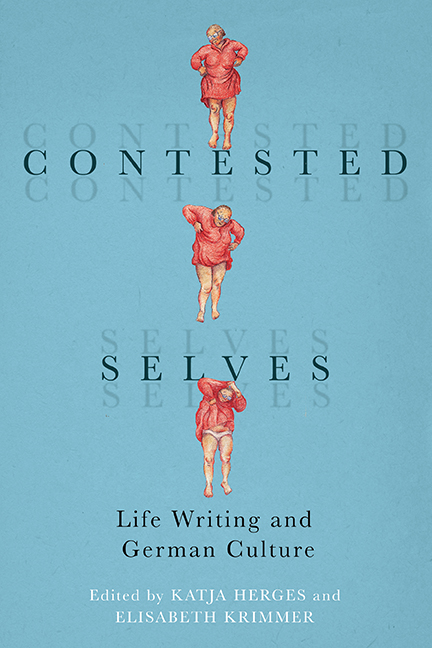Book contents
- Frontmatter
- Contents
- Acknowledgments
- Introduction
- Part I Women’s Life Writing, Female Subjectivity and Agency
- Part II Modern Life Writing and Aesthetics
- Part III Trauma and Vergangenheitsbewältigung
- Part IV Transnational and Transgenerational Life Writing in Contemporary Germany
- Bibliography
- Notes on the Contributors
- Index
4 - A Life of Its Own: Alfred Döblin on Autobiography and the Novel
Published online by Cambridge University Press: 26 May 2022
- Frontmatter
- Contents
- Acknowledgments
- Introduction
- Part I Women’s Life Writing, Female Subjectivity and Agency
- Part II Modern Life Writing and Aesthetics
- Part III Trauma and Vergangenheitsbewältigung
- Part IV Transnational and Transgenerational Life Writing in Contemporary Germany
- Bibliography
- Notes on the Contributors
- Index
Summary
SHORTLY AFTER THE PUBLICATION of Schicksalsreise (1949; Destiny's Journey, 1992), Alfred Döblin's autobiographical account of his time in exile in France and the United States and his return to Germany in November 1945, the author wrote the short essay “Dichten heißt, Gerichtstag über sich selbst halten” (To Write Is to Sit in Judgment on Oneself). In the essay Döblin expresses his fundamental discontent with the genre of autobiography but then goes on to justify his decision to write Schicksalsreise, declaring it a more radical piece of literature than all of his earlier works. Throughout his career he repeatedly voiced his critique of autobiography while continuing to publish autobiographical works. In the following I take the friction between theoretical reflection and autobiographical practice as a point of departure to examine Döblin's poetics of life writing. While Döblin rejected traditional forms of biography and autobiography, he embraced aesthetically progressive attempts to give form to life, notably the modern novel. Reading his autobiographical writings in conjunction with his poetics of the novel, I argue that Döblin saw novel writing and life writing as intricately related in that they engage with the same fundamental aesthetic problem: how to adequately represent the world through language. Döblin's poietic answer to this problem arranges the two modes of writing in an unexpected constellation. He claims that the novel does not simply capture life but creates a higher form of reality (“Überrealität”) and even comes alive itself. In the framework of this nonmimetic aesthetics, the novel is the medium of life writing par excellence, whereas the referential mode of conventional autobiography is considered outdated. By emphasizing the referential dimension of his novels, on the one hand, and by including fictional passages in his autobiographical writings, on the other, however, Döblin straddles the line between genres. As I show in this article, Döblin's poetics of life writing stakes out the space between referential and nonreferential aesthetics and between factual and fictional storytelling and situates his own work simultaneously at the center of this new paradigm and at the margins of established genre conventions. Döblin's autobiographical experiments can thus serve as a prism through which the novelty and limits of this project become visible, even as they disclose its affinity to contemporary debates on the relation between novel and biography.
- Type
- Chapter
- Information
- Contested SelvesLife Writing and German Culture, pp. 95 - 114Publisher: Boydell & BrewerPrint publication year: 2021



